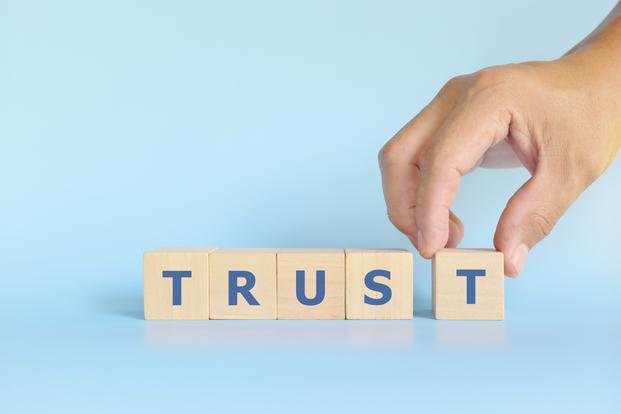The following is an excerpt from Lida Citroen's new book for veterans, "Your Next Mission: A personal branding guide for the military-to-civilian transition." Information about the book is available at www.YourNextMissionBook.com.
I write a lot and am often interviewed by the media on the concept of building, sustaining and regaining trust. Professionals in all industries, from banking to law to real estate, struggle with the concept of getting others to trust and believe in them.
On a daily basis, each of us is bombarded with seemingly genuine marketing messages -- from billboards to online pop-up ads to advertisements posted on the back of restroom stall doors to greetings at networking events -- and it feels like we are constantly being marketed trust. What can we possibly believe to be true?
The messages pushed by many companies, as well as independent professionals, is trust: "You can trust me," "I have your back," and "You're in safe hands with me/us."
In developing a personal brand, the focus must be on promoting that which is relevant and compelling to a target audience. While it is true that most target audiences need to trust the company, service, product or individual who is selling to them, you simply cannot sell trust. Telling someone you can be trusted is not enough.
Here's why: Telling someone you are trustworthy is like saying you're a good kisser -- it really is up to others to assign you that quality, not you. Trust is something you develop over time through respect, rapport and building credibility.
In working with returning military veterans, I've learned that the values around trust and trust building are particularly complex. It took me months of persistence before I was able to get an organization to believe that my intentions and motives for wanting to help veterans with personal branding were genuine and not for commercial purposes. Even as I leveraged my connections in the media to bring a spotlight to the need for more resources -- and, yes, I was on camera speaking on the topic of helping veterans -- some questioned my motives. Is she using the veteran community for personal gain?
As a veteran, you learned to trust your commanders, your fellow servicemen and the orders you were given. There is a sanctity and fraternity to military brotherhood (male or female) that is nearly impermeable. This tight-knit bond and unwavering trust serves as a valuable survival skill and creates lifelong bonds that are almost unimaginable to those of us who have not walked in your boots. "During our basic military training [boot camp, basic training, etc.], we learned to trust the soldiers to our left and right," says an Army sergeant I worked with. "Throughout our service, we learned to trust people from various backgrounds and cultural beliefs. We participate in joint exercises with other countries and trust [with limitations] our allied counterparts."
Now, you will need to learn to trust people who do not have military training and ethics and civilians with specific, valuable expertise who want to help you succeed. This will not be easy, I understand.
Trusting others is not the same as being naive. You will not go blindly along with everyone who offers you help or offers you an opportunity. Undoubtedly, you will encounter companies, consultants and others who want to advise and guide you for a fee, who may not actually have your best interests at heart. Being discriminating and cautious is still important. You still must continue to use a discerning eye and rely on your experience, information and intuition to make good decisions. But you will need to broaden your acceptance of assistance and guidance from those who have something of value to offer you and from whom you choose to accept offers.
Trust Is a Two-Way Street
Enlisting, building and sustaining trust is tricky. While most people list "trustworthy" as a personal quality on their resume, to be someone who is trusted takes effort, time and focus.
Trust also needs to go both ways: You need to be trustworthy to others, and you need to be able to trust other people. Undoubtedly, there are people in the world who might want to take advantage of you, who do not have your best interest at heart. This is not a civilian/military issue. There are also many, many people who will value you for your contribution, who will recognize your potential and who will extend resources to help you become who you are meant to be in this world. They will earn your trust if you are open to it.
As you become someone who is trusted in your career, you will build integrity and credibility in the value of your word, and your reputation will reflect this value. As you learn to believe in and trust other people, then you will continue to display humility, vulnerability and personal accountability as you grow those relationships. Over time, people who matter to you will learn to refer you, appreciate your values and advocate for your career goals.
Keep Up with the Ins and Outs of Military Life
For the latest military news and tips on military family benefits and more, subscribe to Military.com and have the information you need delivered directly to your inbox.












